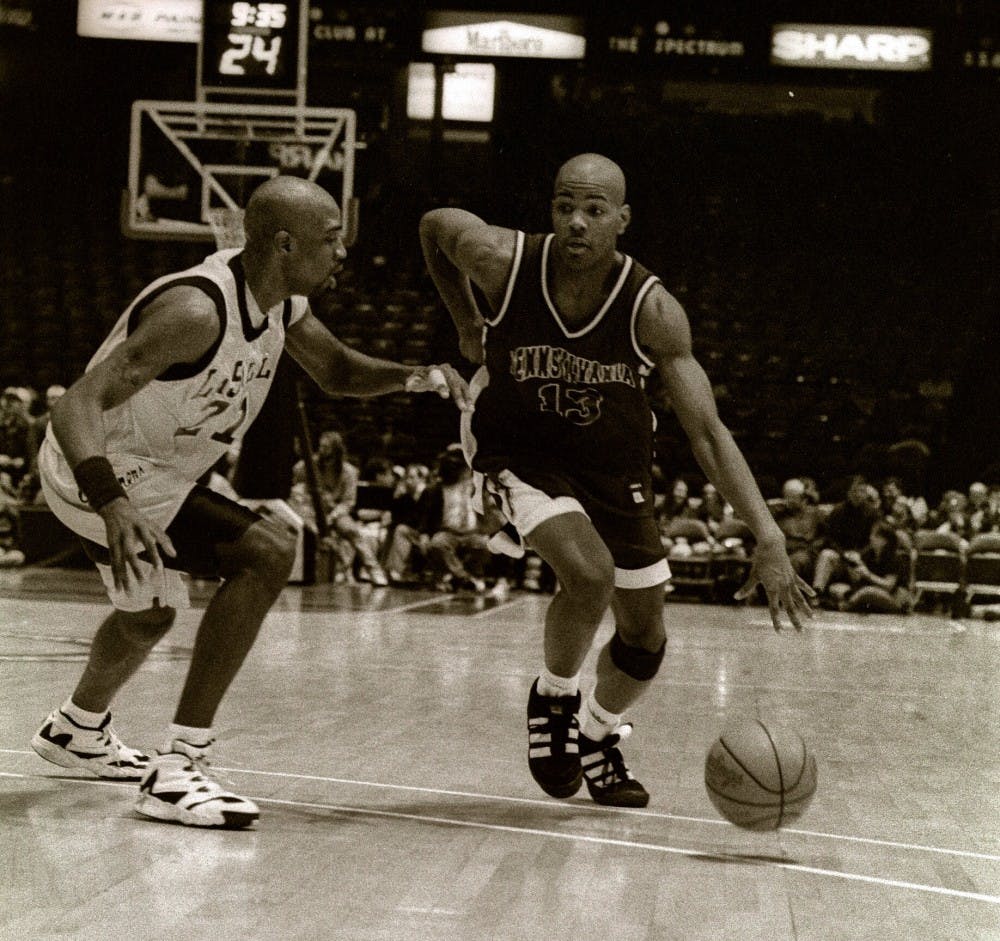
Penn men's basketball assistant coach Ira Bowman was the team's longest tenured coach and also played two seasons for the Quakers before going on to play professionally.
Credit: File PhotoOne would be hard pressed to find someone who loves Penn basketball more than Ira Bowman.
Now in his sixth season as an assistant, Bowman is Penn men’s basketball’s longest tenured coach. Originally an assistant under Jerome Allen, the former player's main task is to coach defensive schemes and rotations for the Quakers.
Still, his focus on defense doesn't mean that Bowman didn't used to get buckets himself. In his senior season at Penn, he averaged 16.4 points per game and garnered Ivy League Player of the Year as well as first-team All-Philadelphia Big 5. In his junior season, he averaged an efficient 10.8 points per game on 57.1% shooting while playing a complementary role to future NBA guards Jerome Allen and Matt Maloney.
After an eight year stint as a professional basketball player, where he played in the NBA and overseas, Bowman entered the coaching ranks as an assistant for New Jersey Institute of Technology (NJIT) in 2009. After a successful stint as an assistant there, Bowman finally retuned to Penn as an assistant under Jerome Allen for the 2012-2013 season.
Aside from the opportunity to coach at a more established program, Bowman took the position to give back to a school that has given him so much.
“My best friends in life, I have made while I was with this program,” Bowman reflected. “I developed some great relationships and I know what it feels like to have Penn on top and that’s my goal — to get Penn back there.”
However, even with all of his success, Bowman was not always destined to be a star for the Red and Blue.
The future Quakers standout originally played for Providence. After two nondescript years where he barely saw the court, Bowman decided to transfer. Unfortunately for Bowman, per NCAA rules regarding transfers, he was forced to sit out the 1993-1994 season.
Led by Penn legends Allen, Maloney, and coach Fran Dunphy, the Quakers ended up beating Nebraska in the NCAA tournament as an No. 11 seed that season. Though it was tough for Bowman to sit out one of the best seasons in Penn basketball history, the current assistant brings many lessons from that season to his job today.
”With the game being taken away from you in a sense, having not being able to compete, builds up some things in you,” Bowman said. “I think that it affects me as a coach now. I have patience but I appreciate every opportunity to learn.”
Additionally, the time spent solely as a practice player enabled Bowman to slow the game down and see it from a different perspective.
In addition to his responsibilities as a defensive specialist, Bowman also shares the responsibility of recruiting with all of the Quakers' other assistants. Even though he was great player in his own right, Bowman does not hit the recruiting trail looking for players that resemble himself.
“For me it’s more about who can help Penn get back to where it belongs,” Bowman said. “Coach [Steve] Donahue coaches a certain style and we just try to find players that fit into the style he wants to coach. It’s never been about me. My time as a player is gone.”
While he may not look for “the next Ira Bowman,” he did admit some current Quakers remind him of himself back in his playing days.
The attributes on this Penn roster that remind him most of himself are freshman Eddie Scott’s athleticism and work ethic, senior Darnell Foreman’s dedication, and sophomore AJ Brodeur’s motor.
All in all, the rich history and tradition and the opportunity to put Penn basketball back on top are what makes this opportunity so special for Bowman.
“I count my blessings everyday I get a chance to walk into the Palestra and come here and interact with kids that are true student athletes,” Bowman said. “Coaching here is different because it’s really what I like to call ‘the Mecca of college basketball.’”
Though Penn has yet to finish above fourth place in the Ivy League during Bowman’s tenure, the Quaker’s improving young core could provide Bowman the opportunity to finally garner an Ivy League crown as a coach.
The Daily Pennsylvanian is an independent, student-run newspaper. Please consider making a donation to support the coverage that shapes the University. Your generosity ensures a future of strong journalism at Penn.
Donate







